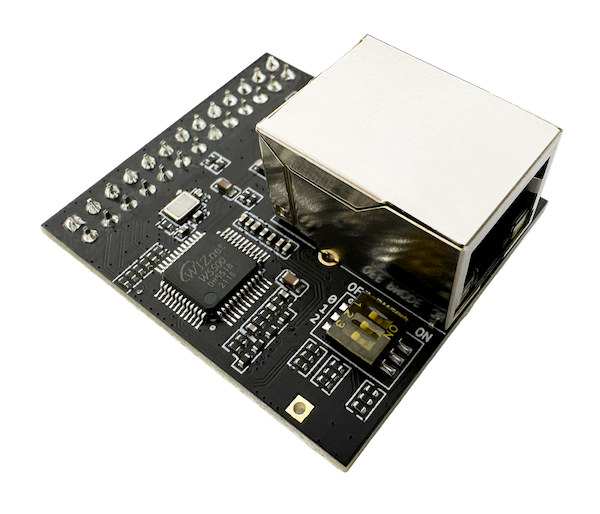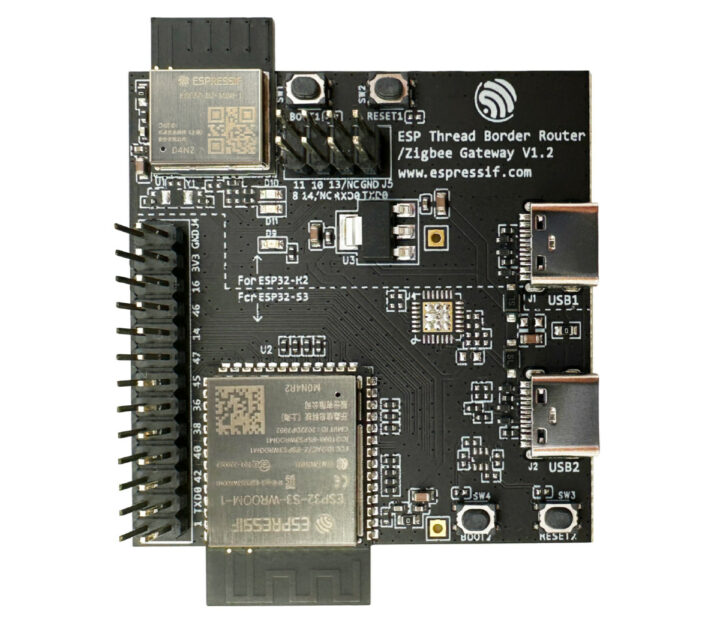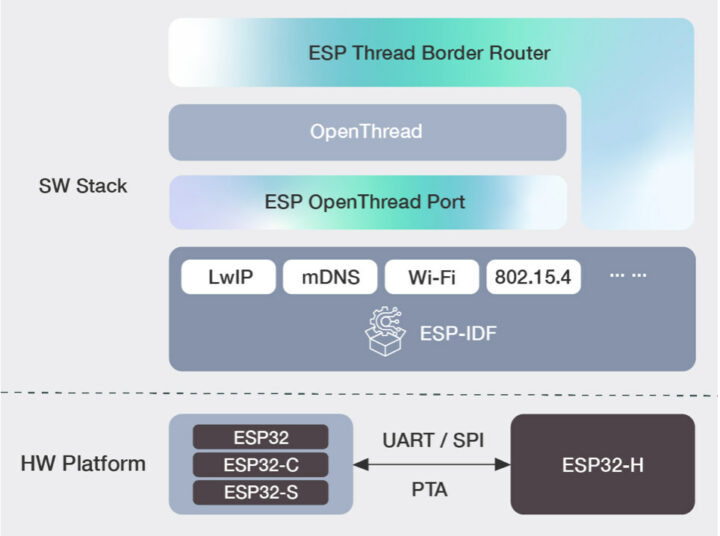Espressif Systems has launched the ESP Thread Border Router/Zigbee Gateway board based on ESP32-H2 (802.15.4) and ESP32-S3 (WiFi + BLE) modules following the contention of the Thread Interoperability Certificate V1.3 for the board and associated ESP Thread Boarder Router SDK built on top of the ESP-IDF framework and the open-source OpenThread protocol stack.
The ESP Thread Border Router supports the protocol functions of the 1.3 Thread standard such as bidirectional IPv6 connectivity, Service Discovery Delegate, Service Registration Server, Multicast Forwarding, NAT64, and more, as well as product-level features such as a Web GUI for device configuration, automatic RCP (Radio Co-Processor) upgrade, RF coexistence, and so on.
ESP Thread Border Router/Zigbee Gateway board specifications:
- Wireless modules
- ESP32-S3-WROOM-1 wireless module
- SoC – ESP32-S3 dual-core Tensilica LX7 microcontroller @ 240 MHz with
- 2.4 GHz 802.11n WiFi 4 and Bluetooth 5.0 LE connectivity
- Memory – 2MB PSRAM
- Storage – 4MB SPI flash
- PCB antenna
- Dimensions – 25.5 x 18 x 3.1 mm
- SoC – ESP32-S3 dual-core Tensilica LX7 microcontroller @ 240 MHz with
- ESP32-H2-MINI-1 (D4N2)
- MCU – Espressif Systems ESP32-H2 32-bit RISC-V microcontroller at up to 96 MHz with 320 KB SRAM, 128 KB ROM, 4 KB LP memory, Bluetooth 5.2 LE/Mesh and 802.15.4 (Zigbee/Thread/Matter) radios.
- Storage – 2MB flash storage
- PCB antenna
- Dimensions – 13.2 x 16.6 x 2.4 mm
- ESP32-S3-WROOM-1 wireless module
- ESP32-S3 <->ESP32-H2 interfaces
- UART and SPI for serial communication
- RESET and BOOT pins for RCP Update
- 3-wire PTA for RF coexistence
- USB – 2x USB Type-C ports one for ESP32-S3, the other for ESP32-H2
- Expansion
- ESP32-S3 – 26-pin GPIO header
- ESP32-H2 – 8-pin GPIO header
- Misc
- ESP32-S3 – Reset and Boot buttons
- ESP32-H2 – Reset and Boot buttons, 3x user LEDs

Espressif Systems also offers sub-boards to further enhance its functionality with an Ethernet interface, a Human-Machine Interface (HMI), and voice control. This development board is primarily made for the development of Thread Border Routers, but it’s also possible to use it for Zigbee Gateway products. If you’re not quite sure what a Thread Border Router does, you can check out our getting started guide for the GL.iNet GL-S200 Thread Border Router kit.
The ESP Thread Border Router SDK can be found on GitHub together with a sample for a basic Thread Border router, and there’s also documentation on Espressif’s website. While Zigbee is supported by the hardware, the company does not seem to have released an SDK for it just yet.
Espressif Systems is selling the ESP Thread Border Router/Zigbee Gateway board on Aliexpress for just $10 plus shipping, and the Ethernet Sub Board is listed there for $8 as well but is currently out of stock. A complete evaluation kit with Thread sensor nodes would have been nice, but you’d need to get your own to evaluate the platform such as a few ESP32-H2-DevKitM-1 development boards, but other Thread certified devices should probably work too.
Via Espressif’s announcement and Hackster.io.
Thanks to Hedda for the tip.

Jean-Luc started CNX Software in 2010 as a part-time endeavor, before quitting his job as a software engineering manager, and starting to write daily news, and reviews full time later in 2011.
Support CNX Software! Donate via cryptocurrencies, become a Patron on Patreon, or purchase goods on Amazon or Aliexpress







Most off the shelf OTBR options are linux router systems with a RCP, this is a nice alternative.
It’s pretty neat! Just thinking that they could have skipped the USB-C connector for the H2, because it should be programmable via the S3 since it is a USB-gadget capable device.
i.e. have the S3 run a firmware with a USB-Serial interface, piped through to one of the UART’s, along with DTR/RTS lines for reset and boot mode selection. That would also allow remote firmware installation, either by implementing esptool in the firmware, or simply mapping the UART to a TCP connection instead.
Of course, it does complicate things somewhat as well, as it means that if your S3 firmware doesn’t include this feature (yet?), then you have to first flash it with one that does, flash the H2, then flash your production firmware back to the S3. Swings and roundabouts, I guess!
The ESP SDK includes over the air update capability.
The S3 can program the H2 RCP, you don’t need to flash the H2. The firmware you flash to the S3 includes the firmware for the H2 as a file, which it can flash to the H2 on startup.
Very aggressive pricing… Would have been great if they had added PoE support, and now someone needs to come up with a nice little box for this.
I believe their ESP32C6 is projected to do this in a single chip, but the software is not ready.
Would you want that in a border router application? It would need to share the radio between protocols, I bet that would come with some limitations.
I believe the 802.15.4 radio in the C6 has been especially designed for this case. It has some special mode where is it always listening.
Interesting, got a link on that feature? I would like to know the limitations, if any.
I don’t work with C6, an Espressif employee told me that’s how they fixed it.